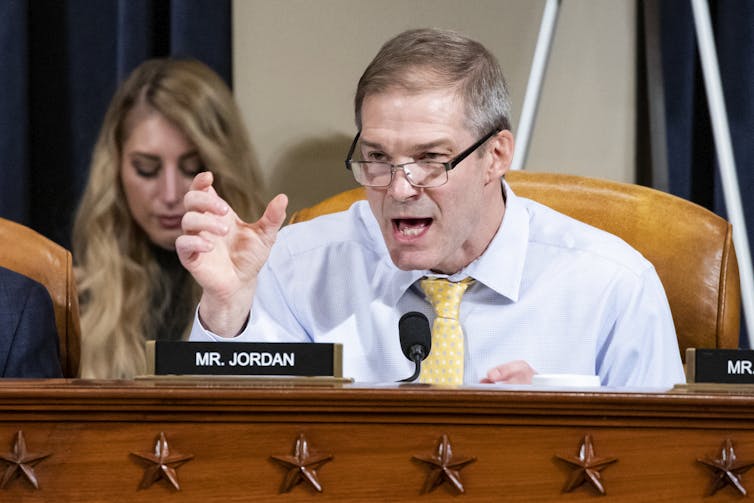

Lee McIntyre, Boston University
While watching the House impeachment hearings, I realized my two decades of research into why people ignore, reject or deny science had a political parallel.
From anti-evolutionists to anti-vaccine advocates, known as “anti-vaxxers,” climate change deniers to Flat Earthers, science deniers all follow a common pattern of faulty reasoning that allows them to reject what they don’t want to believe – and accept what they favor – based on a misunderstanding of how science deals with evidence.
As I’ve been watching the hearings, I’ve noticed that a number of characteristics of this type of reasoning are now being embraced by President Donald Trump and his congressional supporters.
Characteristic acts
There are five common tactics used by science deniers.
In 1998, brothers Mark and Chris Hoofnagle (a lawyer and a physiologist) wrote an early blog post about science denialism. That was followed by further work by econometrician Pascal Diethelm and public health scholar Martin McKee and cognitive scientists John Cook and Stephan Lewandowsky. All identified the following factors as characteristic acts of science deniers:
- Believing in conspiracy theories;
- Relying on cherry-picked evidence;
- Relying on fake experts (and dismissal of actual experts);
- Committing logical errors;
- Setting impossible standards for what science should be able to deliver.
These elements are present when those who deny the Earth is round or who believe vaccines cause autism insist that there is a governmental cover-up of the real evidence on their topics. They can be seen when Ted Cruz tries to discredit climate change with talk about the anomalous world weather pattern in 1998 due to El Niño. And they’re evident when intelligent design theorists complain that evolution by natural selection still has not been proven.

Alternative reality
Trump and his defenders in Congress echo this pattern. Even though Trump has firsthand knowledge of some of the facts under dispute – whereas his supporters may not – all seem to have bought in fully to the idea that the actual political situation is not the one pictured in the mainstream consensus of facts and evidence, but instead is based on an alternative reality.
Here are the five ways Trump and his allies use the same strategies as science deniers:
- Conspiracy theories: During his questioning of Ambassador Bill Taylor and other witnesses at the impeachment hearings, Republican counsel Steve Castor repeatedly pursued a debunked conspiracy theory involving an alleged plot in which the Ukrainian government – and not the Russians – interfered with the 2016 presidential election because they were out to get the president.
- Cherry-picking: Gordon Sondland, U.S. ambassador to the European Union, testified before the House Intelligence Committee that President Trump told him, “I want nothing from Ukraine. I want no quid pro quo.” Trump and his supporters focused on this statement as evidence of his innocence, despite the fact that in other testimony by Sondland that day, he said, “Mr. Giuliani’s requests were a quid pro quo for arranging a White House visit for President Zelensky…Mr. Giuliani was expressing the desires of the president of the United States, and we knew that these investigations were important to the president.”
- Discrediting experts: President Trump has repeatedly – and falsely – claimed that State Department and CIA employees such as Bill Taylor, George Kent, Fiona Hill, Alexander Vindman and others who have testified in the impeachment hearings are “Never Trumpers,” a term for Republicans who do not support Trump – and who therefore have no credibility. His supporters have latched onto this tactic. GOP Sen. Josh Hawley of Missouri said on Sept. 20, after the whistleblower complaint was made public: “It looks to me like another deep-state attack.”
- Illogical reasoning: Trump supporters have claimed that Ukrainian President Volodymyr Zelensky never complained that he felt pressured by Trump to do the investigations into the Bidens that Trump sought. Trump himself has described the July 25 conversation he had with Zelensky in which he asked for the investigations as “perfect.” But news reports have shown that Zelensky did in fact feel pressured, and analysts have pointed out that Zelensky would risk losing crucial U.S. support were he to anger Trump by saying that he felt pressured.
- Double standard for opponents: Trump claimed that written testimony from the whistleblower was unacceptable, despite the fact that he himself had only given written testimony in the Mueller investigation. Some of his supporters seem to agree and have tried to compel the whistleblower’s in-person testimony.
Partisan logic
What might be behind the similarities between Trump defenders and science deniers?
Perhaps, like science denial, all fact denial is basically the same.
All ideology supports the reflex to believe what you want to believe.
Scholars have studied the role of identity in shaping belief and concluded that sometimes even empirical beliefs can be tribal, reflecting what the other people on your team want you to believe. Adherence to a belief is not always based on evidence.
The danger, of course, is that even as new facts come in, people won’t change their minds. This is the direct opposite of good empirical reasoning.
It is the hallmark of science that beliefs should be based on evidence, and that people should be willing to change their beliefs based on new evidence. This means that people should be able to specify in advance what evidence, if it existed, would be sufficient to get them to change their minds.
But are Trump and his congressional supporters doing that?
Like science deniers, no amount of evidence seems sufficient to change their partisan beliefs that the phone call with Zelensky was proper and that Trump “did nothing wrong.”
Even when the facts are overwhelming, congressional Republicans seem, like science deniers, willing to contort their beliefs and torture their logic, to stick to the party line because that is who they are.
As Sen. Lindsey Graham recently put it, “I don’t care what anybody else says about the phone call … The phone call, I’ve made up my own mind, is fine.”
In science, such behavior means that one is eventually read out of the profession – you’re not fired, your tenure isn’t revoked, but you’re no longer taken seriously anymore.
In politics, it is not yet clear what the consequences might be.
Lee McIntyre is the author of:
The Scientific Attitude MIT Press provides funding as a member of The Conversation US.
[ Get the best of The Conversation, every weekend. Sign up for our weekly newsletter. ]
Lee McIntyre, Research Fellow, Center for Philosophy and History of Science, Boston University
This article is republished from The Conversation under a Creative Commons license. Read the original article.


















